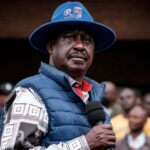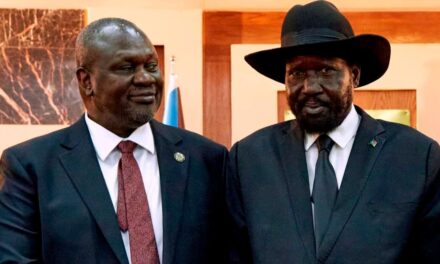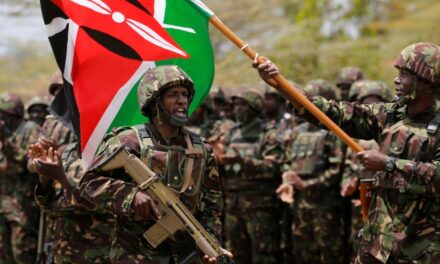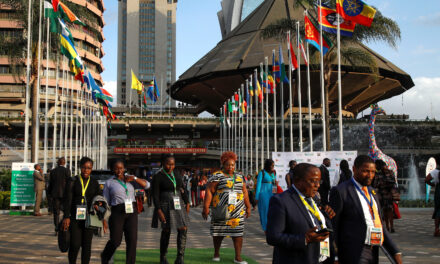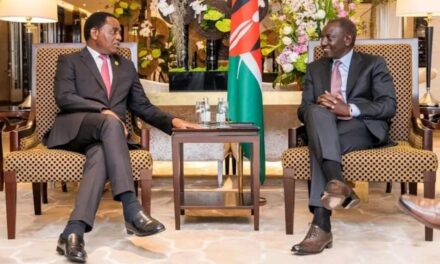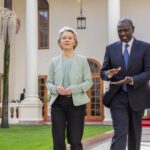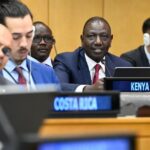

Kithure Kindiki: Kenya’s New DP at Risk of Becoming Another ‘Spare Tire’
| November 1, 2024

A file photo of impeached former Deputy President Rigathi Gachagua (right) and newly sworn-in Deputy President Kithure Kindiki (left) at a past event. Kindiki aims to challenge the perception of the Deputy President as a mere spare tire of the government. Photo: Handout
Historically, deputy presidents—and their predecessors, vice presidents—in Kenya have struggled to make a significant impact, often reduced to mere footnotes in the annals of history, depending entirely on the degree of autonomy granted by the sitting president.
Newly sworn-in Deputy President Kithure Kindiki, a former lawyer and inaugural senator for Tharaka Nithi County, now faces the challenge of breaking this mold as he steps into the nation’s second-highest office.
Kindiki’s rise to this position comes amid a chaotic political divorce following the ousting of his predecessor, Rigathi Gachagua, who was impeached by both houses of parliament.
This tumultuous shift highlights a deep fracture between President William Ruto and Gachagua, the embattled Mt. Kenya kingmaker who played a pivotal role in Ruto’s 2022 presidential victory.
Ruto’s swift decision to nominate Kindiki, who was serving as the Interior Minister, signaled his growing impatience with Gachagua’s erratic behavior and what was seen as reckless rhetoric regarding government affairs.
Despite this opportunity, the path ahead for Kindiki remains uncertain.
President Ruto has yet to publicly outline any specific responsibilities for his new deputy, and there are concerns that Kindiki may adopt a rubber-stamp role for Ruto’s often extreme agenda.
His reputation has already taken a hit, particularly following criticisms of how security forces handled the protests by enraged Gen Z youth in June.
The 52-year-old former law professor was the face of the government in the aftermath of the police’s deadly crackdown on June anti-tax protests.
More than 40 people died in clashes with the police and at least 300 others were wounded, but Kindiki lauded the officers for exercising “restraint” while enforcing law and order. He also denied any shoot-to-kill orders were issued.
The Kenyan Constitution offers little clarity on the role of the deputy president beyond serving as an assistant to the president.
While they are protocol-wise second-in-command, the president holds ultimate authority over their duties and influence.
As a result, many deputy presidents find themselves in positions where they merely sit still and look pretty.
For example, Ruto himself, during his time as Uhuru Kenyatta’s deputy, received few assignments in their second term, especially after Raila Odinga, the opposition leader, carved out a space in Uhuru’s government.
Similarly, Stephen Kalonzo Musyoka’s appointment as vice president during the contentious aftermath of the 2007 election only exacerbated divisions rather than quell them.
His support for the draft constitution during the campaign for the August 4, 2010 referendum and loyalty earned him the disparaging nickname watermelon, a satirical jab likening him to the fruit, which is green on the outside and red on the inside, suggesting a lack of decisiveness.
Mwai Kibaki, who served as vice president before ascending to the presidency, held various influential ministerial posts, including finance and economic affairs.
His experience highlights that while the deputy president role can lead to higher office, it often comes with significant limitations unless actively cultivated.
This cycle of discontent is pervasive; nearly all of Kindiki’s predecessors left office under unhappy circumstances, reinforcing the belief that what could be a pathway to power in many nations instead functions as a curse in Kenya.
Though one deputy president has ascended to the presidency—Daniel Moi, who took office in 1978 following Jomo Kenyatta’s death—such instances are exceptions rather than the rule.
For soft-spoken Kindiki, the deputy presidency presents an opportunity to reshape his public image over the next three years.
However, his lack of substantial political clout in the country raises questions about his long-term viability in this role.
His hurried swearing-in, announced as a public holiday with little fanfare, reflects the public’s indifference toward his appointment and displays the perception that Kindiki may lack the legitimacy needed to effectively serve as Deputy President.
As he embarks on this new chapter, the question remains: Will Kithure Kindiki become another spare tire, relegated to the sidelines of Kenya’s political narrative, or will he carve out a meaningful legacy in the face of historical precedent?
Only time will tell.
Your support empowers us to deliver quality global journalism. Whether big or small, every contribution is valuable to our mission and readers.







